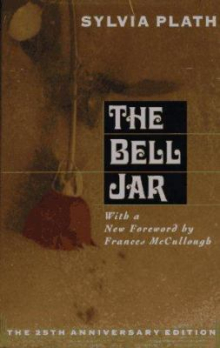
The novel The Bell Jar was written by Sylvia Plath and published in 1963. The novel follows Esther, a young woman aspiring for a future career, and her inner turmoil as she attempts to navigate who she wishes to be.
The novel takes place in New York City in the 1950s, a hub of music, culture, people, and opportunity. Esther, originally from a small town, is interning for a fashion magazine and is unacquainted with the hectic environment. The first half of the novel centers on Esther’s time in New York, where she interacts with various characters, many of whom also participate in the internship. Despite being utterly surrounded by like-minded women who are also experiencing the wonders of their 20s, Esther feels isolated and alone, unable to make meaningful relationships with the women around her and herself. Internally, Esther grapples with a stark sense of anxiety regarding the unknown. Her future career, passions, and romantic relationships all seem out of her realm of understanding and control, with each passing day an unsettling reminder of the unplanned future she’s hurling toward.
After completing her internship, Esther returns to her small, quiet town in rural Massachusetts, still contemplating the many questions bombarding her. Surrounded by familiar strangers, Esther struggles to cope with the intense isolation of her hometown coupled with her lack of direction and slew of failures. This leads her to fall into a deep depression, her isolation growing along with her lack of familiarity with herself. Her depression heightens after receiving news that she failed to qualify for a writing scholarship, her last tether to any semblance of the future, and peaks as she attempts to take her own life. The novel draws to an end as Esther is institutionalized for a period, working with doctors to recover from her depressive episode and mental anguish. Although there is no definitive answer to what Esther’s life will look like, the novel ends on a semi-optimistic note as Esther emotionally improves, better equipped to take on the questions of her future.
The novel is highly compelling and well-written, offering a realistic portrayal of the struggles many endure regarding their mental health and the search we all must go through to find who we truly are and what we want from our lives.
Review by: Nicole de Beauchamp
—Carrie Davies, Young Adult Librarian, West Los Angeles Branch Library